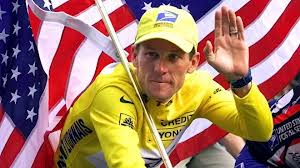CITLALLY MACIEL
<Staff Writer>
What is it about Oprah that always makes people spill the beans to her? Indeed, this week we saw Lance Armstrong admit to Oprah that he used performance-enhancing drugs. Armstrong’s admission will of course unleash many aftereffects.  One of them relates to Armstrong’s defamation lawsuits against all those who have maintained for years that he was using drugs. In addition, it is expected that Armstrong will be stripped of his medals, and his participation in his own Livestrong Foundation may very well be over. The question of the week has been what Armstrong’s confession means for the future of cycling in particular, and for competitive sports in general. Although some people are hopeful that Armstrong’s confession will bring positive changes, my position is rather pessimistic about the potential outcomes. Indeed, as long as competitive sports exist and as long as the stakes are high, competitive athletes will look for ways to boost their performance, even if that means breaking the law or putting their own health at risk.
One of them relates to Armstrong’s defamation lawsuits against all those who have maintained for years that he was using drugs. In addition, it is expected that Armstrong will be stripped of his medals, and his participation in his own Livestrong Foundation may very well be over. The question of the week has been what Armstrong’s confession means for the future of cycling in particular, and for competitive sports in general. Although some people are hopeful that Armstrong’s confession will bring positive changes, my position is rather pessimistic about the potential outcomes. Indeed, as long as competitive sports exist and as long as the stakes are high, competitive athletes will look for ways to boost their performance, even if that means breaking the law or putting their own health at risk.
Recently, it has been discovered that professional football players have been using Adderall, a prescription drug used to treat attention deficit hyperactivity disorder, in order to improve their performance in the game. In an article in the New York Times, it was reported that at least seven players have been suspended for using the drug. According to the article, “athletes are often taking it to fight fatigue and exhaustion. It’s almost like taking 100 cups of coffee. They can take it during training camp when their bodies are especially fatigued, and the other is right before a game, to boost them.” Although the full repercussions of the drug are not well understood, it must be taken for granted that there are some side effects. There is always one side effect or another when it comes to drugs, especially when the drugs are taken without a proper prescription and a thorough medical assessment.
Human growth hormone (HGH) is another example of an enhancing but forbidden drug used by competitive athletes. Human growth hormone is a hormone, naturally produced by the body, which stimulates production of cartilage cells, resulting in bone growth. It also plays an important role in muscle and organ growth. According to the World Anti-doping Agency’s Anti-doping Administration, “HGH has an ergogenic and anabolic impact, and…it enhances the anabolic power of steroids.” Although it seems like there have been only a few instances of athletes being caught using HGH, its use has also been detected among college athletes. Last year, the Canadian Centre for Ethics in Sport (CCES) revealed that a football player of the University of Waterloo tested positive for human growth hormone (HGH).
In her book, Women and Sports in the US: A Documentary Reader, Jean O’Reilly states that although eating disorders are common in many sports; eating disorders, especially anorexia, are more common among those sports where thinness is essential for better performance. These sports include gymnastics, running, diving, and figure skating. Evidently, developing an eating disorder is a serious issue. Eating disorders go beyond being mere tricks to win a medal; they are complex mental disorders that can lead to death. Nonetheless, they are clear examples of the extent to which an athlete will go to remain competitive, and represent a serious problem to vulnerable teenage girls.
The prototype of performance-boosting techniques is certainly the use of steroids. However, as discussed above, there are other drugs and practices that athletes use to get ahead. Although some are more controversial than others and may carry a bigger stigma than others, in the end, they are all dangerous and dishonourable forms of getting ahead. While the issue may seem extraneous to us at first sight, in reality, it is not. Unfortunately, this is an issue that is also becoming common among amateur athletes, including teens. Thus, the influence that the lives of professional athletes have on young people can no longer be discounted. The issue has to be taken more seriously. Beyond having more aggressive anti-doping campaigns by sports officials, there is need for more organic change. Cheating athletes are not always acting alone. From physicians to trainers, sometimes (as in the case of Armstrong) a whole team is behind the charade. Society cannot dismiss the problem anymore when those teenagers in our lives may fall prey to this scheme. Instances of teens committing suicide – depression is a side effect of steroid use – should fade.
 When Oprah asked him if he felt bad about what he did, Armstrong replied: “the definition of cheating is to gain an advantage on a rival or a foe; I didn’t view it that way. I view it as a level playing field.” It is funny how people can twist reality to their benefit and deflect their blame onto others. Essentially, Armstrong has liberated himself from any responsibility because there were others doing it too. Perhaps, if Armstrong had questions regarding ethical issues, he should have opened the regulations manual of the Tour de France instead of referring to a dictionary.
When Oprah asked him if he felt bad about what he did, Armstrong replied: “the definition of cheating is to gain an advantage on a rival or a foe; I didn’t view it that way. I view it as a level playing field.” It is funny how people can twist reality to their benefit and deflect their blame onto others. Essentially, Armstrong has liberated himself from any responsibility because there were others doing it too. Perhaps, if Armstrong had questions regarding ethical issues, he should have opened the regulations manual of the Tour de France instead of referring to a dictionary.
